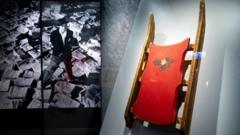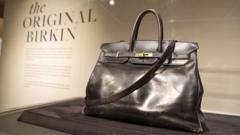One of the world's first calculating machines will not go to auction as scheduled in France, after a Paris court provisionally blocked the historic item from being exported.
Auction house Christie's has confirmed it will not proceed with a bid for the machine La Pascaline, developed by the French mathematician Blaise Pascal in 1642.
Valuations suggested the machine could fetch €2 to 3m (£1.77m to £2.65m). Christie's called it the most important scientific instrument ever offered at auction.
Scientists and researchers made a legal appeal to grant heritage protections to the historic instrument, arguing it should be classified as a national treasure.
Pascal was just 19 years old when he developed the earliest version of a calculator; Christie's noted that only nine of these machines exist today.
It is the first attempt in history to substitute the human mind with a machine, the official collection description reads.
The event marks a significant moment in the history of computing, referred to as a quantum leap in the capabilities of human ingenuity.
La Pascaline was exhibited at Christie's venues in New York and Hong Kong throughout the last year.
The machine was included in Christie's auction of the library of the late Catalonia collector Léon Parcé, which showcased significant works, including Pascal's philosophical piece Pensées and the first printed version of Pascal's wager.
On Wednesday, a Paris administrative court temporarily blocked an earlier export authorization provided by France's culture minister in May, following concerns raised by experts about its historical significance.
Christie's has stated that due to the provisional nature of this decision, they are suspending the sale of La Pascaline. The judge indicated there were serious doubts about the legality of the certificate that permitted the auction, adding that the final judgment is pending.
The court's ruling reflects La Pascaline's historic and scientific value, which could classify it as a national treasure, thus securing it protections under France's heritage code.
The French heritage group, Association Sites & Monuments, named as an applicant in this case, welcomed the court's decision.
With additional reporting by Sebastian Usher, Global Affairs reporter.
















